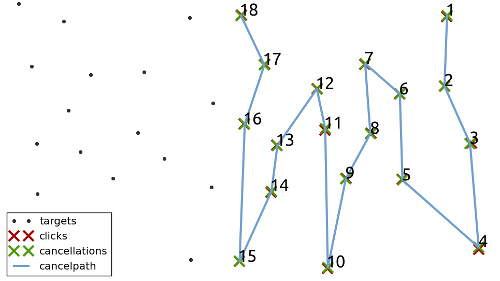easy
CancellationTools sports a simple interface that allows you to start a new task in two button clicks, and analyse the data with two more clicks. This ease-of-use does not impede functionality: CancellationTools calculates every measure, and produces a PDF document with a clear overview of a participant's performance. A batch analysis of a large dataset produces a simple text document that can be directly imported into statistics software (e.g. PSPP, SPSS or R) or a spreadsheet editor (e.g. LibreOffice Calc or Microsoft Excel).
free
CancellationTools is 100% free and open source. We released it under the GNU General Public License (version 3), which ensures that you will always be able to download and use it for free. If you're a code-happy nerd, you are very welcome to have a look at our source code and to help us out with the development via the project's GitHub page.
complete
We went through a lot of effort to find all cancellation measures that researchers have come up with over the past decades. Although the task has traditionally been used to diagnose hemispatial neglect syndrome by comparing the amount of missed targets on the two halves of a task, a lot more information can be extracted.
CancellationTools includes the popular measures of neglect (e.g. the amount of ommissions per half, and the centre of cancellation), as well as measures of disorganized search and timing. These measures have great potential in testing participants' attention allocation, attention span, executive control, and working memory.
versatile
CancellationTools' default task is a Landolt C task, in which circles with and without openings can be presented. You can select the amount and type of targets and distractors, as well as their colour and the colour of the background. You can also choose whether input is given with a computer mouse or with a touch screen, and whether cancellation marks should be visible or not. Of course, we realize that not everybody is keen on using a single type of task. Therefore, CancellationTools gives you the option to import your own. Simply scan a pen-and-paper task, or provide a digital image. CancellationTools will let you indicate where the targets are and save the task, so you will be able to use it for ever after. This provides you with the amazing advantage of being able to run our complete analysis, using your own preferred cancellation task.
high-quality data visualization
CancellationTools produces high-quality graphs that provide insight into a participant's performance at a single glance. The images shown here are actually produced by CancellationTools, but are sized down to fit the page (so their quality is lower than the original output).
cancellation path

omission heatmap

contact
We aim to streamline the feedback process a bit, so that we can respond in the most efficient way. If you find a bug or have a suggestion, please consider notifying us via our GitHub page. GitHub is a platform for large-scale collaboration on software, through which everybody can access the source code, provide suggestions on how to change it, or to simply notify us of any issues that you may have. Alternatively, you could .
Although we appreciate all feedback, please do keep in mind that we get a lot of it, and that we simply do not have the time to respond to everything.
credits
CancellationTools was developed by Edwin Dalmaijer, at the University of Oxford's Cognitive Neurology Lab. Before the standalone version came to be, work on a cancellation task analysis toolbox (that partly made its way into the current software) started at Utrecht University's Helmholtz Institute. Theoretical guidance has been provided by Tanja Nijboer, Stefan van der Stigchel and Masud Husain. Tim Cornelissen contributed to the analysis code. Edwin is supported through a Marie Curie grant titled INDIREA, which has been provided by the European Commission (who would like you to know that anything I say and do is on a personal basis, and does not necessarily reflect the views of the EC). CancellationTools was programmed in Python, using the PyGame, NumPy and matplotlib libraries.
